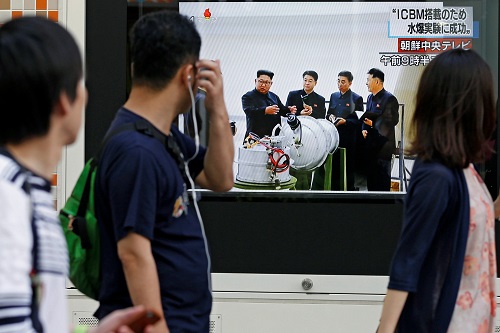Reuters photo
By
Ananya S Guha
21st century expansionism is perhaps like never before. The polarization of the world, the US-Korea conflict, flexing of muscles by China and the constant skirmishes between India and Pakistan, the rise of new race ideologies, religious and Islamic fundamentalism have severed the world into tight holes of petty power and volatility. What does all this lead to?
The missile and nuclear threats and ‘tests’ by North Korea have posed a threat to world security, coupled with American retaliation in South China seas. Technology is supposed to unify world vision, thinking and even relationships, but that it is a double edged sword is proved beyond doubt.
Why do countries want to cross borders, and flout expansionist policies? China’s constant incursions into Ladakh, Arunachal Pradesh and now Bhutan, shows how territorial sovereignty and a ruthless at all cost expansionism is the hallmark of 21st century geopolitics. In a way it is akin to British imperialism in the 18th, 19th and 20th centuries.
But of course in present day contexts, testing of the missile, hydrogen bombs, purchase of the nuclear arsenals for ‘peaceful’ purposes is a feverish rat race. How can purchase of arsenals be for peace? Armament strengthening is a sign for preparedness of war. The more there is talk of disarmament, the more the world is gearing for armament purchase, which is a corporate market on the one hand, and flexing muscles on the other.
Where can the clap trap of peace be then? The more money is diverted for purchase of weapons, the more development of a country takes a bashing, especially in underdeveloped economies. Today a country like India has one of the highest percentages of malnourished children, comparable to Saharan Africa, in addition to the ubiquitous poverty.
The exodus of refugees, first from Syria and then from Myanmar, both because of religious fundamentalism and warring with US backed regimes, is another dimension to a world crisis. So refugee problems become secondary, and get lost in the fight with nations.
But how has world surveillance got infected with religious fundamentalism, taking the shape of a terror war? Countries like the US must give this answer with bloody histories in Iraq, Iran and Afghanistan. Then came the Middle East, to nibble at wealth and oil resources. American imperialism does not believe in setbacks, even if it means death of civilians, men women and children. The photo of the Syrian boy, washed away by the ravaging sea has not yet probed our conscience, world conscience.
In between such frenetic dialogue or even monologue countries are sanctioning deals, exports and imports to other countries. The nuclear deals are examples of the worst kind of abetting in corporate deals, fueling the world into dangerous divides.
This is a new world, with mobile phones and computers carrying out day to day human transactions, with societies like in India striving for a cashless economy, but it is hardly brave. It is only the stamp of muscle power, bullying, threatening which are some of the worst signs of human effeteness.
Ananya S Guha
Ananya S Guha was born and brought up in Shillong, North East India. He has seven collections of poetry and his poems have been published worldwide. They have also been featured in several anthologies. He is also a columnist, critic and editor. He now is a Regional Director at the Indira Gandhi National Open University and holds a doctoral degree on the novels of William Golding.



No Comments Yet!
You can be first to comment this post!